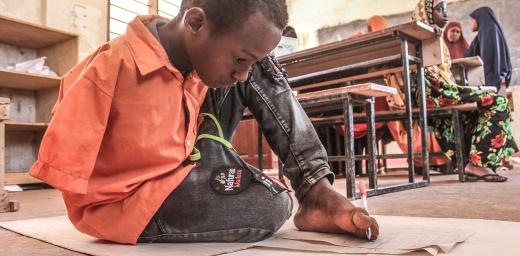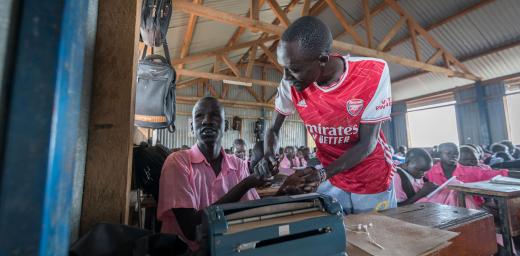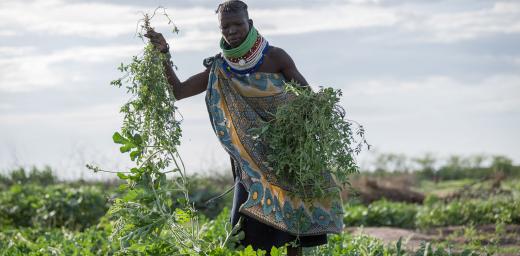Deaf students in Kakuma aim for the sky
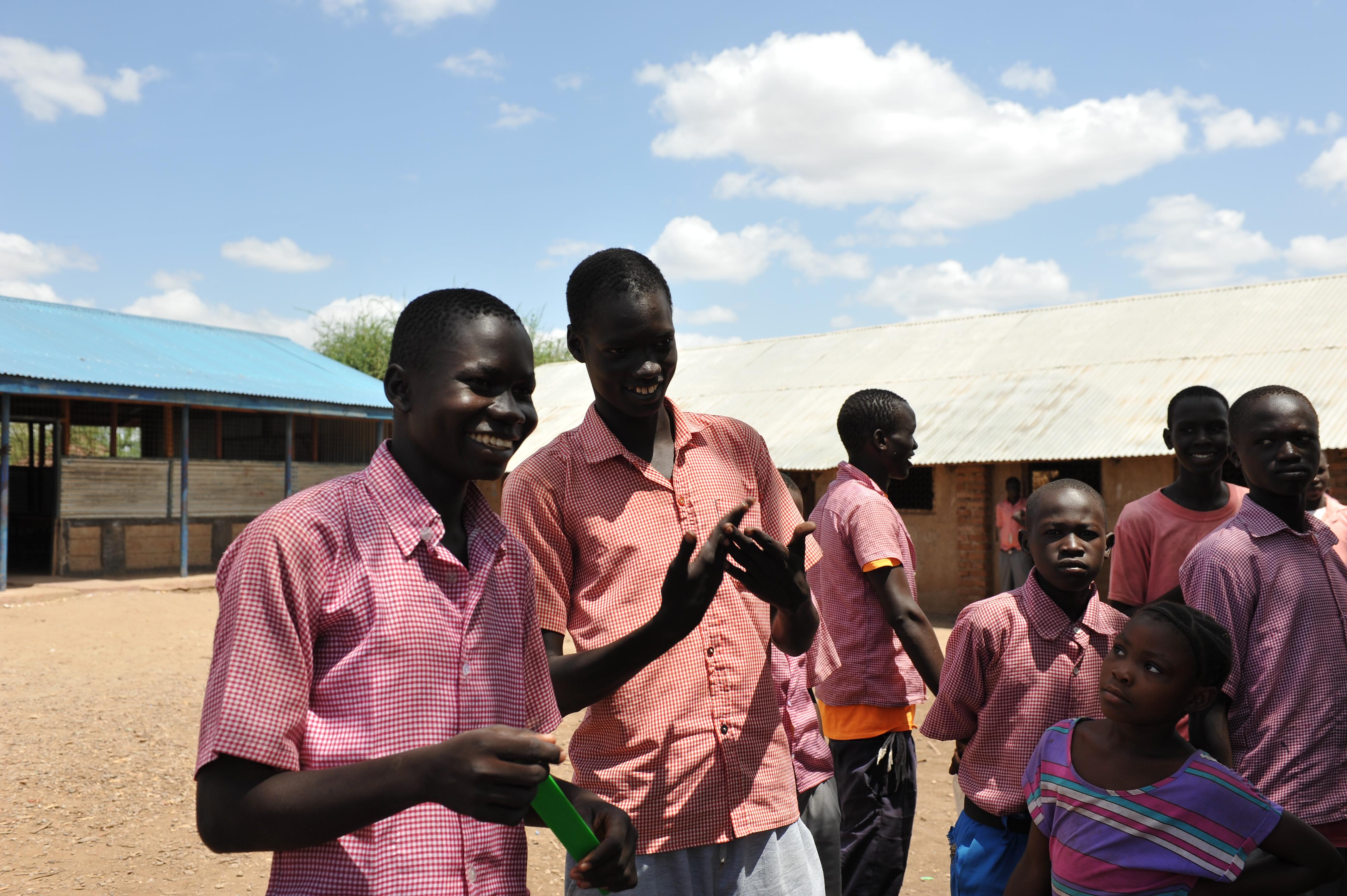
Maliah and Abdulbagi joke with a teacher, as other boys look on - the boy's primary school is mixed with students with and without disabilities learning together. Photos: LWF/ C. Kästner
LWF integrates students with disabilities into schools in the refugee camp.
Abdulbagi (17) wants to be a pilot when he finishes school, his friend Maliah (18) plans to train to be a driver. “For the big trucks,” he specifies. Abdulbagi is not convinced: “How will you notice the other cars?”, he asks. – “How are you planning to fly the planes?” Maliah teases back. It’s a conversation without uttering a word, with gestures and sign language: Abdulbagi and Maliah are two of the six candidates in the special class for deaf students in Fashoda Boys Primary School, Kakuma refugee camp, run by The Lutheran World Federation (LWF).
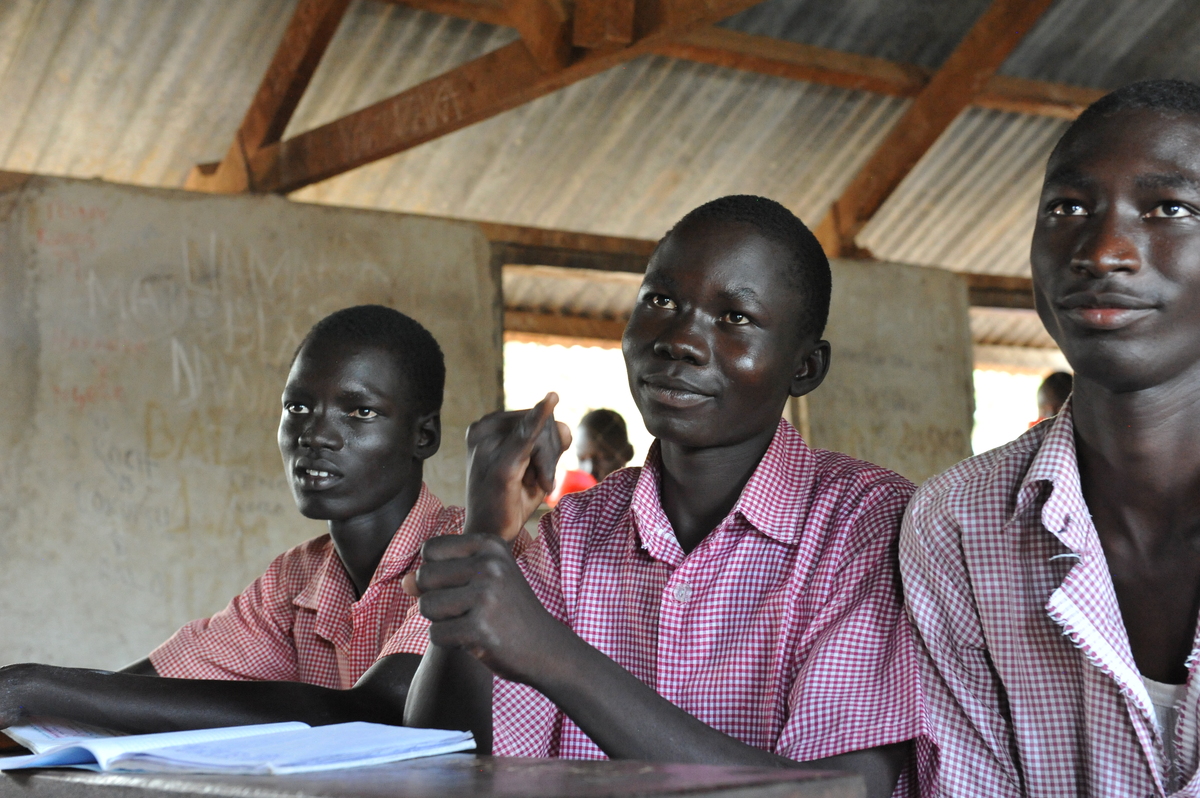
Abdulbagi (middle) discusses with his teacher.
140 students per class
“We started integrating children with physical disabilities in 2010 ,” Damian Okello, LWF education officer, explains. “We try to remove the institutional and infrastructural barriers that keep them from school.” For students with mobility impairments, it means providing wheelchair access. For deaf students, a teacher has to be trained from both the Kenya Institute of Special Education and an in-house training on sign language by LWF.
The program was first rolled out in early childhood development level and later graduated through to primary school level. “We try to encourage inclusive education but the main challenge is the high enrolment per class which makes it hard to execute an individualised educational program. The current teacher pupil ratio is 1:140,” Okello says.

Overcrowded classrooms in Kakuma refugee camp. A student-teacher ration of 140:1 is very common.
“You can hardly move, how can you manoeuver a wheelchair or attend to one student’s special needs?” one of the teachers asks. The biggest obstacle to the students’ education however, are often their own families.
“In most local cultures, a disability is considered an evil spirit or a punishment to the parents. They have committed a sin, and now their child is obsessed or cursed,” Okello explains. With drastic consequences for the affected children: “Men divorce their wives, parents neglect their children,” he says. “They are tied up and kept in bed or tied up outside the house.”
“Sometimes the whole scenario is so pathetic you just have to intervene,” Okello adds.
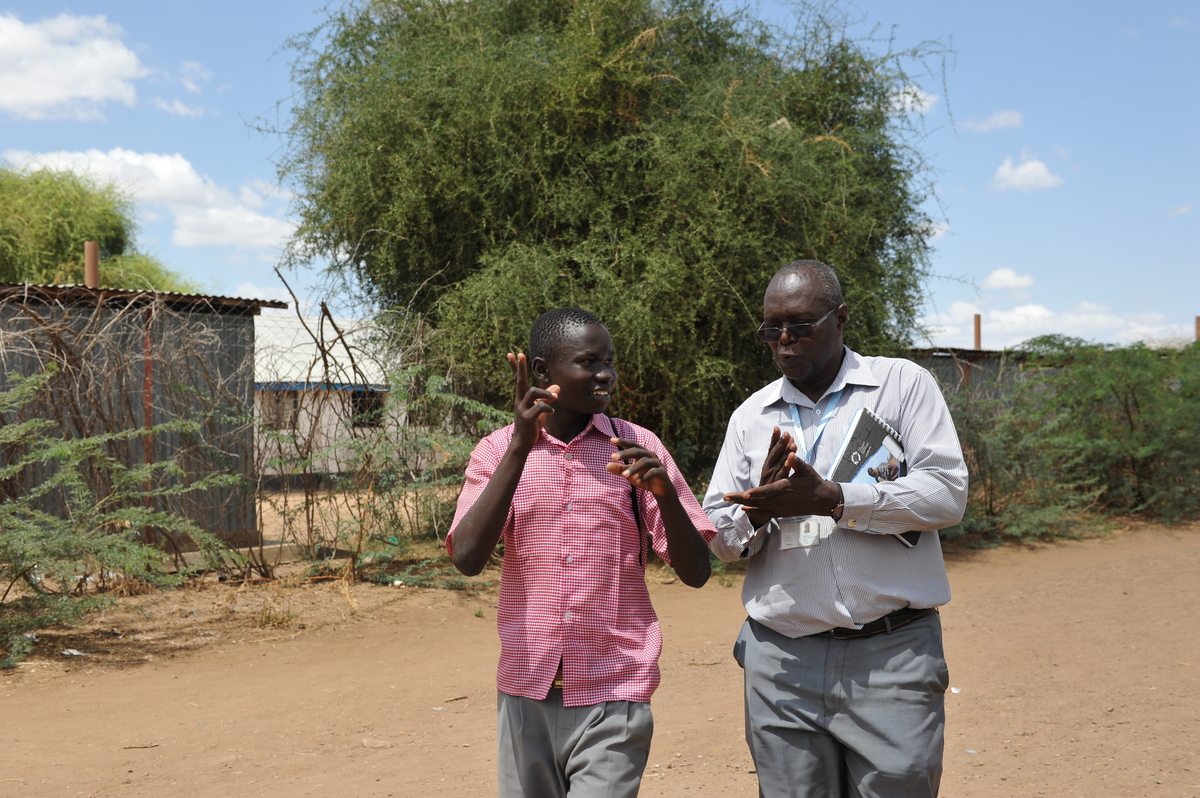
Abdulbagi and LWF staff damian Okello discuss school issues on a visit to the boy's family.
Helpless parents
Even in the best cases parents are often helpless in dealing with special children, LWF staff have observed. “There is little support to teach them how to care for special children. The parents do not know how to communicate with a child who is deaf or care for a blind child. In any case, their education is not given priority”, Okello says.
Abdulbagi and Maliah have experienced the literal loss of words in their own families. Maliah says his family just ignored him and called him useless, until he left them and asked a local church for a place to sleep. He has been living in the church building for months. Abdulbagi lives with his two older brothers, who themselves are teachers. “Sometimes it is difficult to understand each other,” he says.
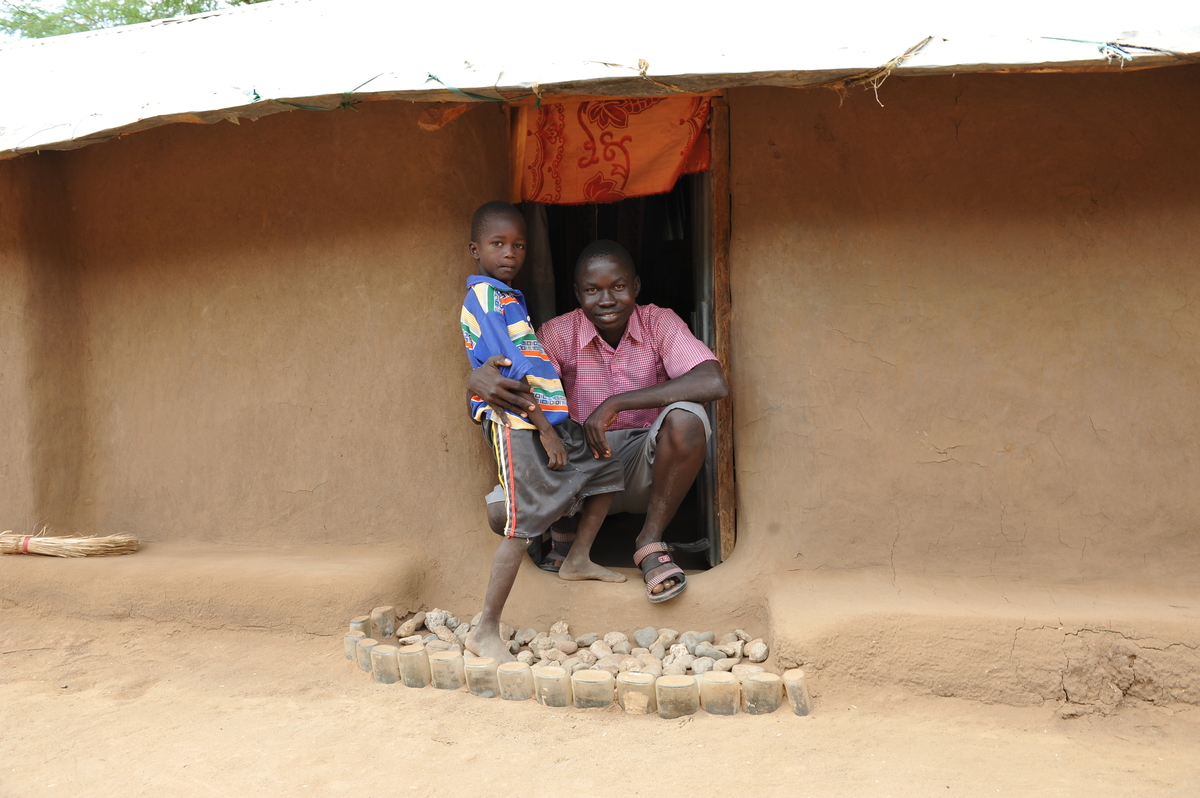
Abdulbagi with his younger brother in the family home. Many students with disabilities do not experience much support from their families.
Awareness campaigns
LWF has been conducting awareness campaigns in the local communities, helping parents to identify disabilities and raising awareness about how to raise and support these children. Also, LWF is building an assessment center in Kakuma, to screen and diagnose children with disabilities for more targeted aid. “Right now we do not know how many students with disabilities we have here, and how severe those disabilities are,” Okello says.
He hopes the center will provide the necessary data and also make it easier to refer children for hearing aids or even surgery. It is a start to at least remove the obstacles for children and youth with disabilities . “We do not have appropriate facilities for students with mental disability in Kakuma refugee camp yet,” Okello says.
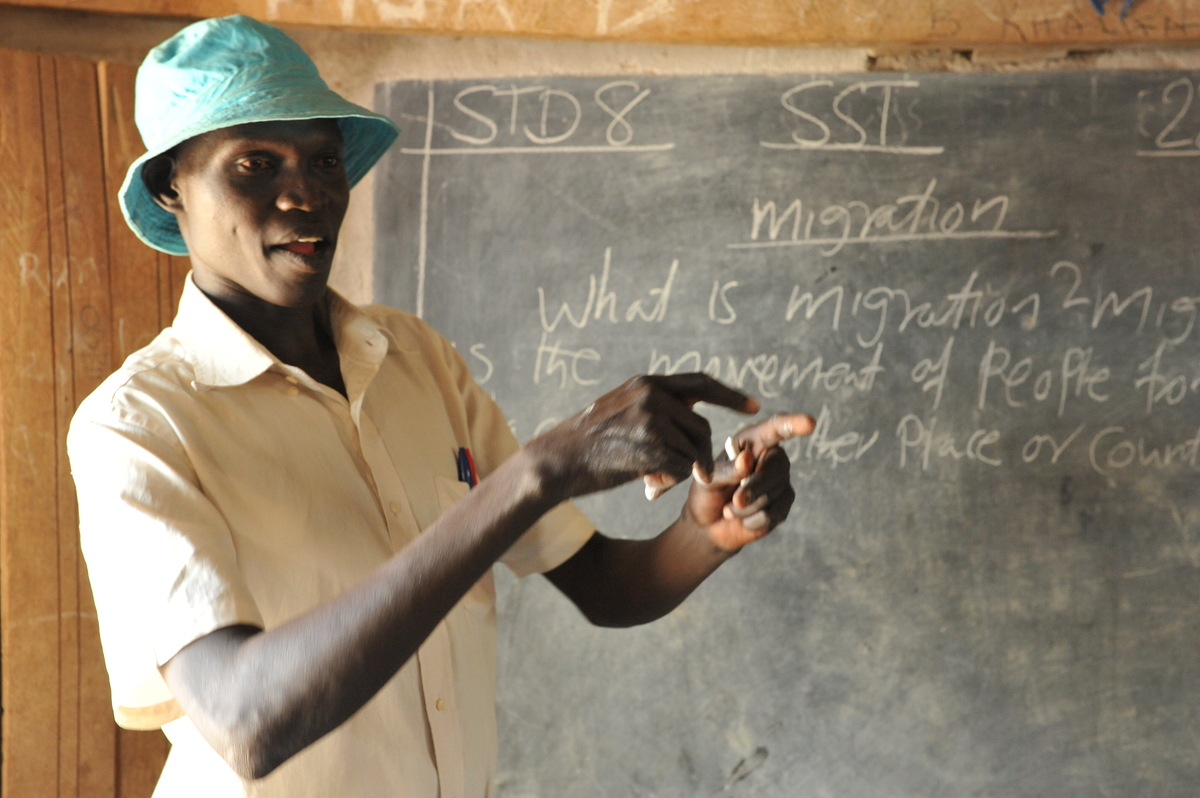
Instruction in sign language. The teacher was especially trained for the task.
Even for good students like Abdulbagi and Maliah, the only way forward to further education would be through a scholarship to one of the Kenyan national boarding schools for deaf students. Both study hard for the final primary exams, taking previous students from their class as an example who “did remarkably well,” as one of the teachers says.
Big dreams
Abdulbagi and Maliah dream of a future in peace – not only away from the war in their homeland South Sudan, but also safe and independent from people who treat them as a burden to the community or even the family. Despite the negative experience with his family, Maliah wants to have a house, where he plans to live together with all his relatives. “I will build a fence so nobody can disturb me,” he says – people from the camp tend to steal the clothes when he hangs them up to dry.
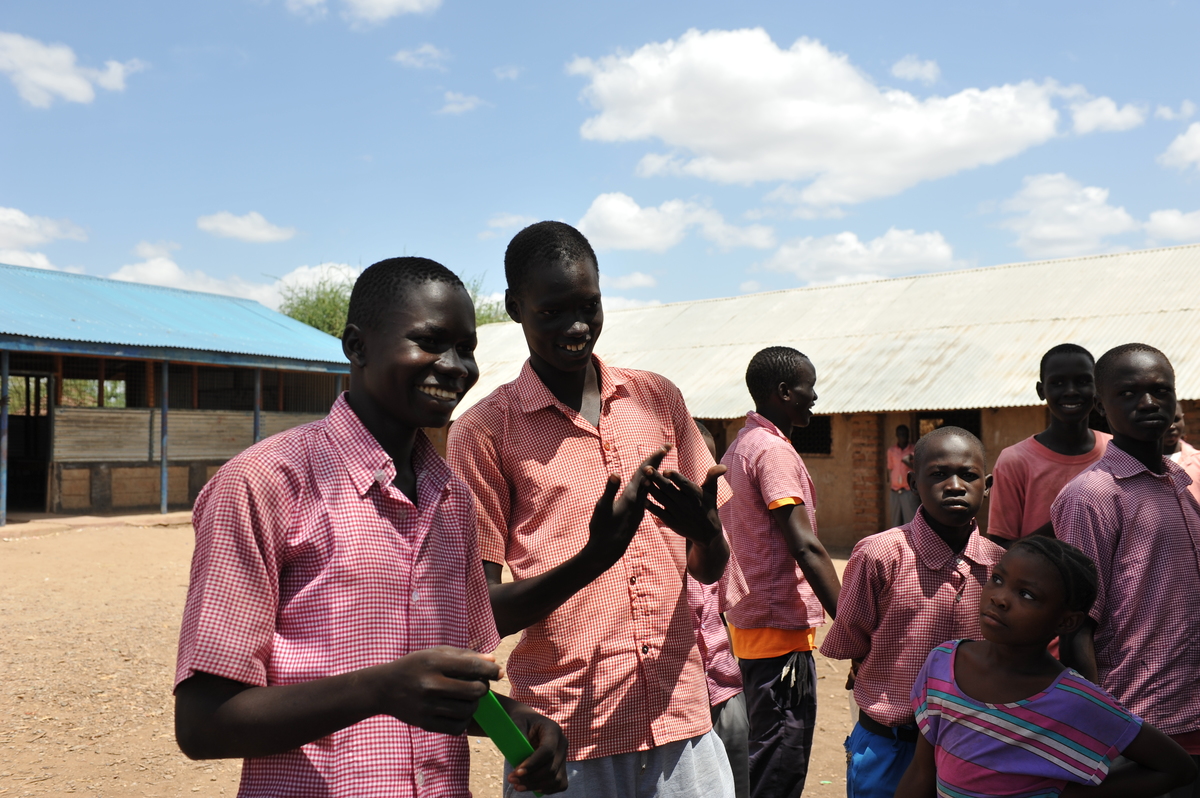
Maliah and Abdulbagi joke with a teacher, as other boys look on - the boy's primary school is mixed with students with and without disabilities learning together.
For both of them, their future will be in the place where they grew up. “Kakuma is home,” Abdulbagi says. “We cannot go back, the same people who brought peace to South Sudan also started the war.”
Their ideal future will also make it possible to practise their dream professions. Maliah is sure that drivers communicate in gestures most of the time anyway. Abdulbagi hopes that by the time he has finished his education, there will also be a way for a deaf pilot to fly an airplane.
LWF’s work for education in Kakuma refugee camp is funded by the European Union (ECHO).
Text and photos by Cornelia Kästner, LWF communications


